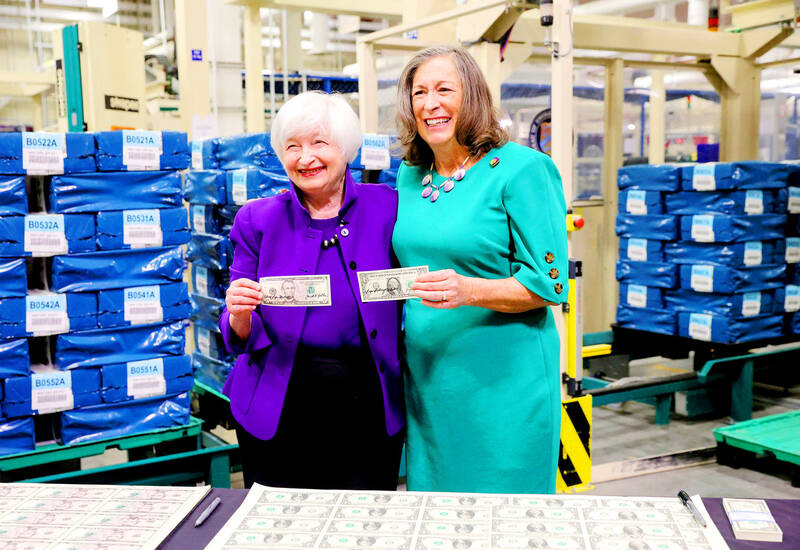US Secretary of the Treasury Janet Yellen on Thursday said she still expects that the US economy would avoid a recession, despite widespread forecasts by analysts and investors for another downturn.
As to “whether or not we can avoid a recession, I believe the answer is yes,” Yellen told reporters during a visit to Fort Worth, Texas.
She highlighted that US payrolls so far have avoided declines.

Photo: Reuters
The Treasury head added that she expects deeper engagement ahead with China, and is open to a trip to the country — though there is no specific plan for that at this point.
Most economists see the US falling into a recession next year, according to a Bloomberg survey last month.
That is after the steepest increases in the US Federal Reserve’s key interest rates since the early 1980s. However, job growth has remained solid in recent months, something that is inconsistent with broad economic slumps.
“Without seeing significant net nationwide layoffs, I believe we’re on the right track in terms of lowering inflation and a recession’s not inevitable,” Yellen said.
The secretary also flagged that, “as businesses tone down their expectations for growth and are slightly diminishing their hiring plans, quits have declined a little bit.”
“Supply-chain bottlenecks are clearly beginning to ease. That’s helpful” with respect to inflation, Yellen said.
The Treasury secretary was also asked about whether she might visit China.
This week, heads of global lenders, including the IMF and the World Bank, have been on their first in-person visit to China since the COVID-19 pandemic began.
“I have no definite plan to visit China, but I am certainly open to it and look forward to more intense interactions than we’ve had over the last year or two,” Yellen said.
A key issue for the Treasury, along with international lenders, has been encouraging China to be more generous in debt relief for developing nations, given that it is the biggest individual official lender.
Yellen said she had raised the debt issue with her Chinese counterpart, departing Vice Premier Liu He (劉鶴), and other officials, but had not seen much progress.
“I am hopeful that they will come to understand the necessity of relieving debt, restructuring debt when it’s unsustainable, and that could be a topic for future meetings,” she said.
Yellen added that China faces a “very complex problem” in adjusting its COVID-19 policies, which have caused growth to slow, but suggested that the use of Western-developed “mRNA” vaccines might help the situation.
A positive change in China’s COVID-19 situation could lead to a “pickup” in growth, she added.
Additional reporting by Reuters

Intel Corp chief executive officer Lip-Bu Tan (陳立武) is expected to meet with Taiwanese suppliers next month in conjunction with the opening of the Computex Taipei trade show, supply chain sources said on Monday. The visit, the first for Tan to Taiwan since assuming his new post last month, would be aimed at enhancing Intel’s ties with suppliers in Taiwan as he attempts to help turn around the struggling US chipmaker, the sources said. Tan is to hold a banquet to celebrate Intel’s 40-year presence in Taiwan before Computex opens on May 20 and invite dozens of Taiwanese suppliers to exchange views

Application-specific integrated circuit designer Faraday Technology Corp (智原) yesterday said that although revenue this quarter would decline 30 percent from last quarter, it retained its full-year forecast of revenue growth of 100 percent. The company attributed the quarterly drop to a slowdown in customers’ production of chips using Faraday’s advanced packaging technology. The company is still confident about its revenue growth this year, given its strong “design-win” — or the projects it won to help customers design their chips, Faraday president Steve Wang (王國雍) told an online earnings conference. “The design-win this year is better than we expected. We believe we will win

Power supply and electronic components maker Delta Electronics Inc (台達電) yesterday said it plans to ship its new 1 megawatt charging systems for electric trucks and buses in the first half of next year at the earliest. The new charging piles, which deliver up to 1 megawatt of charging power, are designed for heavy-duty electric vehicles, and support a maximum current of 1,500 amperes and output of 1,250 volts, Delta said in a news release. “If everything goes smoothly, we could begin shipping those new charging systems as early as in the first half of next year,” a company official said. The new

Quanta Computer Inc (廣達) chairman Barry Lam (林百里) is expected to share his views about the artificial intelligence (AI) industry’s prospects during his speech at the company’s 37th anniversary ceremony, as AI servers have become a new growth engine for the equipment manufacturing service provider. Lam’s speech is much anticipated, as Quanta has risen as one of the world’s major AI server suppliers. The company reported a 30 percent year-on-year growth in consolidated revenue to NT$1.41 trillion (US$43.35 billion) last year, thanks to fast-growing demand for servers, especially those with AI capabilities. The company told investors in November last year that